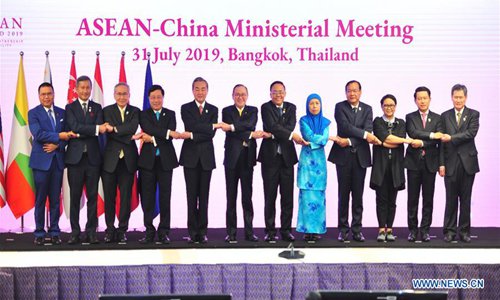
Chinese State Councilor and Foreign Minister Wang Yi (5th L) takes part in the China-ASEAN foreign ministers' meeting in Bangkok, capital of Thailand, July 31, 2019. (Xinhua/Rachen Sageamsak)
China and the countries of the Association of Southeast Asian Nations (ASEAN) agreed here Wednesday to forge closer ties at the China-ASEAN foreign ministers' meeting.
Chinese State Councilor and Foreign Minister Wang Yi said at the meeting that ASEAN and ASEAN-led cooperation platforms have played an indispensable role in maintaining social stability and economic growth in the East Asia region amid profound global changes unseen in a century.
He said China attaches great importance to the relations with ASEAN, which has become a banner for regional cooperation, and the two sides have always stepped forward hand-in-hand since establishing the dialogue partnership 28 years ago, in particular since the establishment of the strategic partnership 16 years ago.
China and ASEAN have been working to consolidate political mutual trust and have always respected each other, Wang said.
The two sides have been devoted to practical cooperation and work for mutual benefit and win-win results, bringing bilateral economic and trade cooperation to a new height, Wang said.
Efforts have been made to jointly build the Belt and Road Initiative for improved regional connectivity; people-to-people and cultural exchanges have been strengthened, and mutual learning and understanding have been promoted; multilateralism, economic integration and trade and investment liberalization in the region have been pushed forward, according to Wang.
The two sides have attached great importance to properly handling contradictions and differences so as to maintain peace and stability, Wang said.
Consultations on the Code of Conduct in the South China Sea have been pushed forward proactively and the first reading of its single draft negotiating text was finished ahead of the schedule, Wang said, noting that it showed the firm belief of relevant countries to build regional rules and maintain peace and stability in the South China Sea.
As the China-ASEAN cooperation has broad prospects, the two sides should strive for a higher level of strategic partnership and build a closer community of shared future under the guidance of the China-ASEAN Strategic Partnership Vision 2030, Wang said.
The two sides should also achieve the synergy between the Belt and Road Initiative and the Master Plan on ASEAN Connectivity 2025, narrow the development gap within ASEAN, and make innovation cooperation a new growth point in China-ASEAN relations, Wang said.
Wang also stressed security cooperation and cultural exchanges to further improve relations between China and ASEAN.
The foreign ministers of ASEAN countries congratulated on the 70th anniversary of the founding of the People's Republic of China at the meeting.
The ASEAN-China dialogue partnership has become the most important and vibrant dialogue partnership of ASEAN, brought the most mutual benefits, and served as the driving force for regional peace, stability and regional growth, they said.
The two sides have been committed to cooperation in political security, economy and other areas and have achieved satisfactory results, according to the foreign ministers.
The foreign ministers said ASEAN hopes China will more deeply participate in ASEAN-centered cooperation mechanisms and ASEAN is ready to achieve the synergy between the Belt and Road Initiative and the Master Plan on ASEAN Connectivity 2025.
ASEAN will also work for the early completion of the Regional Comprehensive Economic Partnership (RCEP) negotiations, expedite consultations on the Code of Conduct in the South China Sea, and safeguard multilateralism and free trade in a bid to maintain regional peace and stability and push for greater development of ASEAN-China relations, ASEAN foreign ministers said.
After the meeting, Wang told a press conference that China and ASEAN countries reached five important consensuses at the China-ASEAN foreign ministers' meeting and they are: to dovetail China's Belt and Road Initiative with the Master Plan on ASEAN Connectivity 2025, to designate 2020 as the year for China-ASEAN digital economy cooperation, to jointly safeguard multilateralism and oppose unilateralism and protectionism, to jointly establish regional rules, and to work together to maintain peace and stability.
Also at the press conference, Wang, While answering a question on the US-led Indo-Pacific Strategy and the ASEAN Outlook on the Indo-Pacific, said that any initiative and vision should focus on the cooperation in East Asia and the entire Asia rather than affect the existing mechanisms on cooperation and their achievements, focus on cooperation and consensus rather than stir up geopolitical confrontation, focus on promoting openness, inclusiveness and transparency rather than form cliques and factions.

